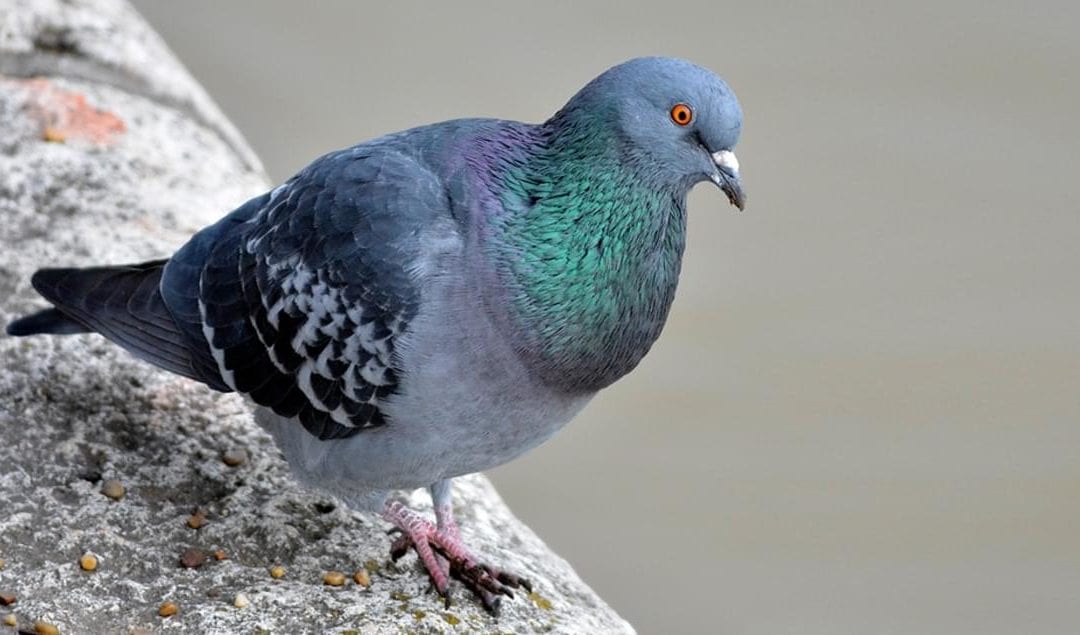
by Pigeon Patrol | Jan 4, 2022 | Pigeon Predators, Pigeon Spikes, Pigeons, Pigeons in the News, Raccoons, Sparrows
Pigeons are those cute, plump little birds that seem to pop up everywhere. From the Rock Pigeon to the Mourning Dove, there are many different types of these birds roaming in the city and country. One unique habit of these birds is the way they nest. They have a unique way of building their nests, taking turns sitting on the eggs, and then taking care of their young in that nest. We have all you need to know about pigeon nesting habits.
Pigeon Nest Locations
The main requirement for a pigeon nesting site is that it is dry and protected on a flat surface. They usually like to nest in attics, on roofs, ledges, eaves, and under bridges. Their natural nesting site would be on a rocky cliff crevice or in a cave. This is why they typically nest on high, flat ledges.
Courting And The Nest
The nest isn’t a true home until a male pigeon finds his mate. The male starts to build the nest while calling out for a mate. He’ll sit on the nesting site until he attracts his lady. He will often strut around cooing at his favorite lady. If the female is interested, she will return the favor. The two will “kiss” by billing each other. After the male pigeon attracts his favorite female pigeon, he will start searching for nesting material. He does not want to waste any time. He will start to bring her one twig at a time. If the female pigeon doesn’t stay up to his pace, he will drive her into the nest and strike her with his wings. Finally, the female will take the twigs he has brought her, tucking them underneath her as the nest starts to build around her. Pigeons usually remain together for eternity. They usually mate in pairs. After they go through their dating stage and mate, it’s time to have squabs. If one of the pigeons passes away or is somehow separated, one will mate with another single bird. During the day, the male sits on the completed nest that usually contains one or two eggs. The female will take her turn overnight. Pigeons nest throughout the year. They might have 10 squabs each year.
The Look Of A Pigeon Nest
If you stumble upon a pigeon’s nest, it’s not a pretty sight. It looks like a mess of grass stems, pine needles, twigs, sticks, and other debris. It’s piled up with a small depression in the middle. A nest is used throughout the year, so it will start to accumulate more droppings and feathers. Many birds remove droppings from the nest, but pigeons do not. The droppings start to essentially glue together all of the nesting materials. After a brood is pushed out of the nest, the pair uses the same site for the next brood. They simply add new nesting material. These “new” nests may include mummies of pigeons that didn’t survive and unhatched eggs. A nest that is reused multiple years may grow up to eight inches tall and 20 inches wide. They may weigh almost five pounds.
Nest Eggs
The female usually lays about two eggs within the first few days of nesting. One unique thing about pigeons is that both the male and female will sit on the eggs to insulate them. Most of the time, the female will be in the nest from the middle of the afternoon to the middle of the morning. This will go on for about 18 days.
The young pigeons called “squabs” are born covered in yellow down. While the squabs are in the nest, they eat crop milk. Crop milk is thick regurgitated liquid that comes straight from the parents’ mouth. Squabs are fed this way for about ten days when they can start eating what the adult female and male pigeon eat. The squabs will double their size in about two days. This makes baby pigeons one of the fastest growing vertebrates. In two weeks, baby pigeons will get their flight feathers. They’re covered in feathers by their third week of life. Their tail will completely full of feathers by their 28th day of life. It’s now time to leave the nest. The time that a squab is in their nest is about 15 days longer than most backyard birds. Once the pigeon is gone, the female pigeon will begin laying new eggs almost every month.
Getting A Glimpse Of Squabs
Many people wonder why they never see baby pigeons. This is because baby pigeons love their nest. They hang out in their nest as their feathers grow in. Squabs are a tasty dinner, so it’s important they stay in their nest so they aren’t eaten. The baby pigeons will finally leave their nest when they are full grown. The short, fat pigeons that are usually seen on your lawn, woodpigeons, you’ll be able to identify a young pigeon because they don’t have a white flash on their neck until they’re adults. Getting a glimpse of these babies is tough because they’re well protected and don’t need to leave until it’s time.
Unique Eating In The Nest
If you are lucky enough to observe baby pigeons, you’ll notice their feeding cycle is unique to other birds. Besides eating their crop milk, they have other special patterns. Either the female or the male will feed the squabs. Once the parent lands near their nest, it seems to be a race as to which bird will be the first to insert their tiny beak to get that food. The parents stay dedicated to feeding their babies until they’re able to leave the nest. Every day, one or the other would arrive with food for the young birds.
NOTE: though tempting, if you stumble upon a pigeon nest, try to resist the urge to feed the squabs yourself. It’s important that they get fed by mom or dad. If you want to help out and do your part, the adult pigeons would probably love some pigeon seed.
Returning Home
Pigeons are loyal to their nests. As we mentioned before, they have numerous broods in one nest. These birds are known to return to whatever their home may be. Pigeons were used to carry messages are far back as 2500 BC, The ancient Greeks and Romans used them to carry messages, then Persia and Syria made a messaging service with pigeons. In the 19th century, pigeons carried messages for news agencies and financial institutions and news agencies in Europe and even providing an airmail service in New Zealand. The point is that pigeons are a bird that know how to take a message somewhere then return home. They can gather food all day, then return to their nest without any issues.
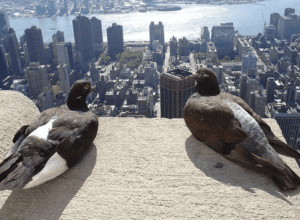
Pigeon Nests And You
Depending on where you live, you may want to help provide nests for the local pigeons (or alternatively if there are too many pigeons around already, possibly deter them from nesting in your area). Here are some tips:
Providing Nests
If you are in a place where you can provide a nest for pigeons, it’s important that each pair of birds gets at least two nests. This is because pigeons usually have a few broods of squads. They need two nests so they can adequately care for each brood of the baby pigeons or their eggs. Their nest should be build twelve inches square. You should always attach a three-inch long perch. They prefer tobacco stems, straw, or hay as the base of a constructed nest.
Deterring Nests
If you would rather your home not become a nest for these sweet squabs, you should keep things very clean. Pigeons like to build nests in a place of shelter. They don’t like a lot clutter or clamor. They usually make their nests when no one is using an areas. If you don’t want them on your patio, make sure to keep it swept. They love to pick up leftover debris to make nests.
Moving A Nest
It’s important to never move a pigeon’s nest. It might seem normal if you think they might be in danger, but a nest location is critical to their survival. Only licensed professionals can move a pigeon’s nest. Pigeons don’t have a sense of smell to find their new nesting location. If you move a nest, the parent may abandon their young. This is critical because squabs need parents, even after they have left the nest. The male and female pigeon will still show their young how to escape from predators, fly, and integrate with the flock. If you need to move a nest, it is best to wait a few months until the squabs are for sure out and about on their own. The parents will be forced to make a new nest elsewhere for their next brood.
Backyard Tips
You may spot a pigeon in your backyard. They are attracted to large, open areas where it is easy for them to find food places on the ground. The only issue with this is that ground food can attract rodents. It’s usually best to only feed pigeons when you see them in your yard. They enjoy peas, dried corn, or sorghum.
Final Words
A pigeon nest is a unique home that can house hundreds of birds over time. Each brood is full of new squabs hungry for their new life. If you get a chance to see a squab in their pigeon nest, take note of the excitement. The nest is an artistic place where parents can raise dozens of little squabs until they’re ready to bust into the world on their own.
Pigeon Patrol Products & Services is the leading manufacturer and distributor of bird deterrent (control) products in Canada. Pigeon Patrol products have solved pest bird problems in industrial, commercial, and residential settings since 2000, by using safe and humane bird deterrents with only bird and animal friendly solutions. At Pigeon Patrol, we manufacture and offer a variety of bird deterrents, ranging from Ultra-flex Bird Spikes with UV protection, Bird Netting, 4-S Bird Gel and the best Ultrasonic and audible sound devices on the market today.
Voted Best Canadian wholesaler for Bird Deterrent products ten years in a row.
Contact us at 1- 877– 4– NO-BIRD, (604) 585-9279 or visit our website at www.pigeonpatrol.ca
Pigeon/Pigeon Patrol / Pigeons Roosting / Vancouver Pigeon Control /Bird Spikes / Bird Control / Bird Deterrent / Pigeon Deterrent? Surrey Pigeon Control / Pest /Seagull deterrent / Vancouver Pigeon Blog / Birds Inside Home / Pigeons in the cities / Ice Pigeons/ What to do about pigeons/ sparrows , Damage by Sparrows, How To Keep Raccoons Away, Why Are Raccoons Considered Pests/ De-fence / Pigeon Nesting/ Bird Droppings / Pigeon Dropping/ woodpecker control/ Professional Bird Control Company/ Keep The Birds Away/ Birds/rats/ seagull/pigeon/woodpecker/ dove/sparrow/pidgeon control/pidgeon problem/ pidgeon control/flying rats/ pigeon Problems/ bird netting/bird gel/bird spray/bird nails/ bird guard
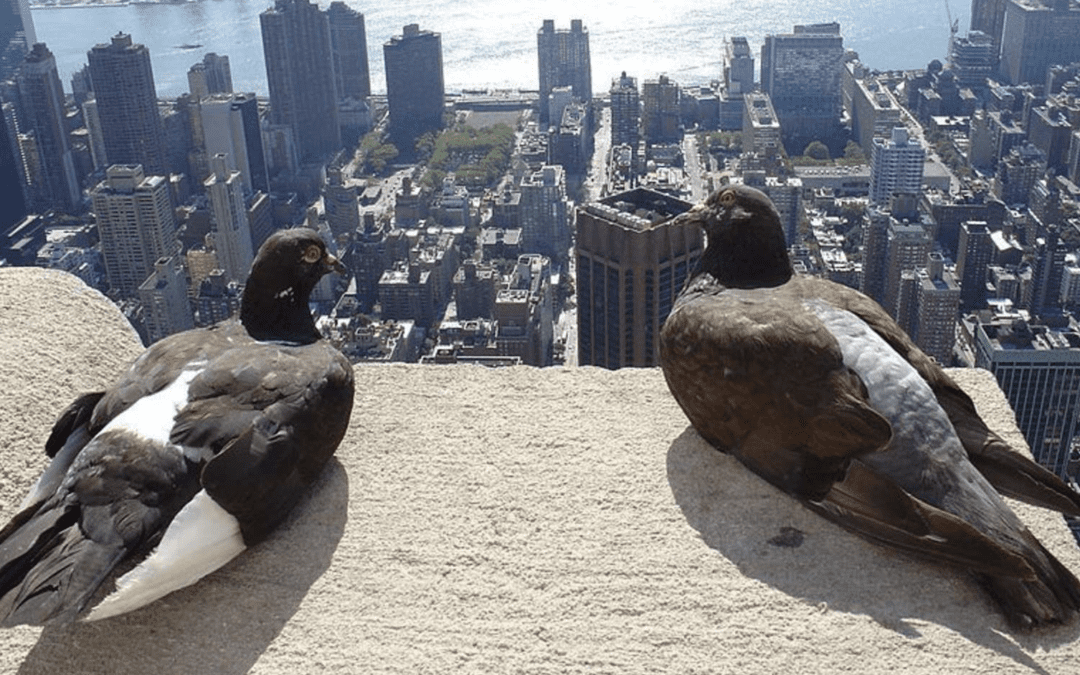
by Pigeon Patrol | Dec 24, 2021 | Pigeon Patrol's Services, Pigeon Predators, Pigeon Spikes, Pigeons, Pigeons in the News
Pigeons may seem harmless, but these pest birds cause millions of dollars in damage every year to buildings, ventilation systems, machinery, statues, roofs, and much more. Bird droppings and nesting materials left by pigeons pose physical problems and health hazards that can become very serious if not corrected quickly making prompt and effective professional bird control is often essential.
Potential Health Hazards:
There are many health risks associated with pigeons and their droppings. The bacteria, fungi, and ectoparasites that they and their droppings harbor are numerous. The four most common ways disease is passed by bird to human are: inhalation of fecal dust, food and water contaminated with bird feces, direct contact with feces, and parasitic transfer.
Pigeon droppings can expose humans to many diseases, including salmonella, Newcastle disease, candidiasis, encephalitis, orthosis, and toxoplasmosis. In addition, they can also carry cryptococcosis, and coccidiodomycosis, which cause meningitis. The droppings may also harbor growth of fungus, which causes histoplasmosis. Fleas, lice, mites, and other pests often live on these birds, hitching a ride to where ever they want to jump off. Pigeons may also attract other pests, such as rats, which feed on dead pigeons and food that well-intentioned bird lovers may scatter for them.
In addition to disease, bird droppings are known for triggering 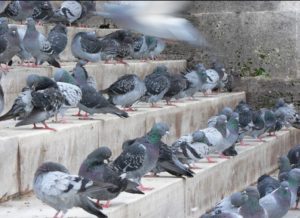 people to slip and fall, which makes it especially important to rid the birds from highly trafficked areas.
people to slip and fall, which makes it especially important to rid the birds from highly trafficked areas.
Damage Caused by Pigeons:
These are messy birds, leaving droppings everywhere they go, particularly near their roost sites. Pigeon droppings are not just gross, they are also full of uric acid which makes them extremely corrosive. The droppings are the direct cause of millions of dollars in damage to buildings and other structures. Particularly vulnerable are painted surfaces, awnings, signs, and other similar surfaces. A tragic example of the corrosiveness of pigeon droppings is the Minnesota bridge accident in 2007, which was found to be the direct result of bird droppings eating away at the metal bridge supports until they weakened.
In addition to the damage cause by their acidic droppings, pigeon nests can also cause damage. Pest birds will often build nests in gutters or on roof corners blocking essential drainage systems. Every year several warehouses experience roof damage, and even collapse, when drainage systems have been blocked and standing water rises just six inches. Bird nests can also block ventilation systems, which not only prevents exhaust of potentially harmful gases, but also has the potential to spread diseases. Fire is also a potential hazard. Nesting materials are usually flammable, consisting of twigs, straw, grasses and dried droppings. When pest birds build their nests inside electric signs or other machinery there is a great risk of fire.
Pigeons are creatures of habit and highly social. Once they have found a cozy spot the will return again and again, bringing along more of their pigeon pals. Prolific breeders, pigeons can hatch several broods a year, sometimes even laying a new clutch before the previous have even hatched. Often our buildings and structures have architectural features such as drain spouts and eaves that make perfect nesting spots for these birds. Pigeons are comfortable around humans and they’re hard to scare away or deter. Once a flock of stubborn unwanted pigeons have set up shop in/on your building, it can be stubbornly resistant to removal, often requiring the services of a pest control or animal control professional. As is true of many pests that invade our homes and businesses, the first step to controlling feral pigeons is to remove their food source.
Tips to deter pigeons:
- Don’t feed the pigeons.
- Screen drains and gutters to make your property less attractive to pigeons.
- Encourage children to pick up spilled food – and teach them NOT to feed pigeons
- Keep areas around trash bins and outdoor dining areas clean
- Eliminate water sources such as bird baths, over-watered lawns, or kiddy pools.
Source
Pigeon Patrol Products & Services is the leading manufacturer and distributor of bird deterrent (control) products in Canada. Pigeon Patrol products have solved pest bird problems in industrial, commercial, and residential settings since 2000, by using safe and humane bird deterrents with only bird and animal friendly solutions. At Pigeon Patrol, we manufacture and offer a variety of bird deterrents, ranging from Ultra-flex Bird Spikes with UV protection, Bird Netting, 4-S Bird Gel and the best Ultrasonic and audible sound devices on the market today.
Voted Best Canadian wholesaler for Bird Deterrent products ten years in a row.
Contact us at 1- 877– 4– NO-BIRD, (604) 585-9279 or visit our website at www.pigeonpatrol.ca
Pigeon/Pigeon Patrol / Pigeons Roosting / Vancouver Pigeon Control /Bird Spikes / Bird Control / Bird Deterrent / Pigeon Deterrent? Surrey Pigeon Control / Pest /Seagull deterrent / Vancouver Pigeon Blog / Birds Inside Home / Pigeons in the cities / Ice Pigeons/ What to do about pigeons/ sparrows , Damage by Sparrows, How To Keep Raccoons Away, Why Are Raccoons Considered Pests/ De-fence / Pigeon Nesting/ Bird Droppings / Pigeon Dropping/ woodpecker control/ Professional Bird Control Company/ Keep The Birds Away/ Birds/rats/ seagull/pigeon/woodpecker/ dove/sparrow/pidgeon control/pidgeon problem/ pidgeon control/flying rats/ pigeon Problems/ bird netting/bird gel/bird spray/bird nails/ bird guard
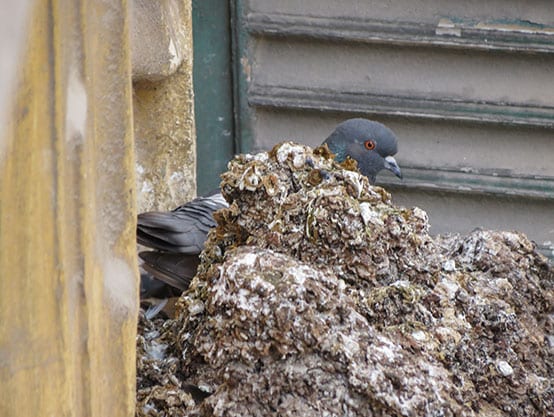
by Pigeon Patrol | Dec 24, 2021 | Pigeon Spikes, Pigeons, Pigeons in the News, Raccoons, Sparrows
While birds might be fun to watch, the damage that they can leave on your balcony and lawn furniture isn’t. Not only is pigeon poop unsightly, but it can also be a health hazard. It’s important to make sure to clean it from your home’s outdoor areas.
Health Precautions
Bird feces carries with it hazards like slipping, but can also carry health risks as well. This is because it contains pathogens that can be harmful to humans if ingested. When you are cleaning pigeon droppings, you will want to make sure that you take the proper precautions by wearing gloves, a mask, closed-toe shoes, and long sleeve pants and top. Immune-compromised individuals shouldn’t clean up pigeon droppings.
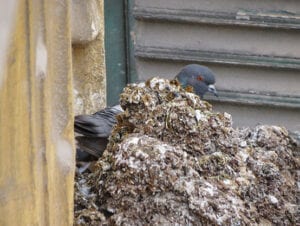
a pigeon bird standing by guano manure
Multipurpose Method for Pigeon Poop
Whether you have a wood, cement or metal balcony, this method can help you remove stains and poop from your scenery.
Materials
- Scraper (plastic)
- Broom and dustpan
- Dishwashing detergent like Dawn
- Water
- Bucket
- Scrub brush
- Baking soda
Instructions
- For stuck-on droppings, take the scraper and remove it from the balcony. You are just trying to scrape off all the larger pieces. Be careful not to gouge wood.
- Use the broom and dustpan to sweep this up and dispose of it properly.
- Fill the bucket with warm water and add a tablespoon of detergent.
- Use the scrub brush to remove any fecal matter. This will take a bit of elbow grease.
- For stains, sprinkle the area with baking soda and allow it to sit for 30 minutes or so.
- Use the scrub brush to scrub the area.
- Rinse with water.
- Allow to air dry.
Cleaning a Wood Balcony
Depending on your balcony, you might take a different approach with wood. This method can help remove stains and odor from wood.
Supplies
- Scraper
- Broom and dustpan
- Club soda
- Baking soda
- White vinegar
- Spray bottle
Method
- Use the scraper to remove any dried-on poop.
- Broom the area and use the dust pan to dispose of the fecal matter.
- Mix vinegar and water in a 50/50 mixture in the spray bottle.
- Spray the crusted areas and allow it to sit for 10-30 minutes.
- Rinse with club soda.
- Apply baking soda to stained areas and use the scrub brush. This will help to remove loosened up fecal matter and remove stains.
- Allow the baking soda to sit for 30 minutes.
- Rinse the area.
- Allow to air dry.
Removing Pigeon Poop from Metal
Metal is tougher stuff, so you can add a little more power to the mix.
What You Need
- Hose or power washer
- Laundry detergent
- Water
- Scrub brush
- Towel or rag
- Spray bottle
- Broom and dustpan
- Polishing compound
How to Clean
- Remove any loose poop with the broom and dustpan.
- In the spray bottle, mix 1 tbsp. of laundry detergent with 2 cups of water.
- Saturate the stuck on areas with the soapy water.
- Allow the mixture to sit for about 10-15 minutes.
- Take the rag or towel and remove the softened areas.
- Get the power washer or hose and spray the areas until all the poop is removed.
- Since pigeon poop is acidic, check the metal for signs of wear.
- Using a rag, apply the polishing compound.
Using Commercial Cleaners
If natural cleaners like detergent and baking soda aren’t covering it, commercial cleaners are available that can be substituted. These also work great for areas that need lots of cleaning or larger areas. These include:
Getting Rid of the Smell
If you are looking to get rid of the pigeon dropping smell rather than the actual fecal matter, try vinegar and water or baking soda.
- To use baking soda for odor, just sprinkle it on the area and let it sit, then hose or broom it off.
- Mix 50/50 vinegar and water in a spray bottle and spray the area. Allow the vinegar to air dry to remove the smell.
All the Birds
Whether pigeons are overtaking your balcony or you just need to clean up a few random areas, several methods are available for cleaning your balcony depending on the type of material it is made out of. Thankfully, most of these methods only require items in your standard house cleaning arsenal.
Source
Pigeon Patrol Products & Services is the leading manufacturer and distributor of bird deterrent (control) products in Canada. Pigeon Patrol products have solved pest bird problems in industrial, commercial, and residential settings since 2000, by using safe and humane bird deterrents with only bird and animal friendly solutions. At Pigeon Patrol, we manufacture and offer a variety of bird deterrents, ranging from Ultra-flex Bird Spikes with UV protection, Bird Netting, 4-S Bird Gel and the best Ultrasonic and audible sound devices on the market today.
Voted Best Canadian wholesaler for Bird Deterrent products ten years in a row.
Contact us at 1- 877– 4– NO-BIRD, (604) 585-9279 or visit our website at www.pigeonpatrol.ca
Pigeon/Pigeon Patrol / Pigeons Roosting / Vancouver Pigeon Control /Bird Spikes / Bird Control / Bird Deterrent / Pigeon Deterrent? Surrey Pigeon Control / Pest /Seagull deterrent / Vancouver Pigeon Blog / Birds Inside Home / Pigeons in the cities / Ice Pigeons/ What to do about pigeons/ sparrows , Damage by Sparrows, How To Keep Raccoons Away, Why Are Raccoons Considered Pests/ De-fence / Pigeon Nesting/ Bird Droppings / Pigeon Dropping/ woodpecker control/ Professional Bird Control Company/ Keep The Birds Away/ Birds/rats/ seagull/pigeon/woodpecker/ dove/sparrow/pidgeon control/pidgeon problem/ pidgeon control/flying rats/ pigeon Problems/ bird netting/bird gel/bird spray/bird nails/ bird guard
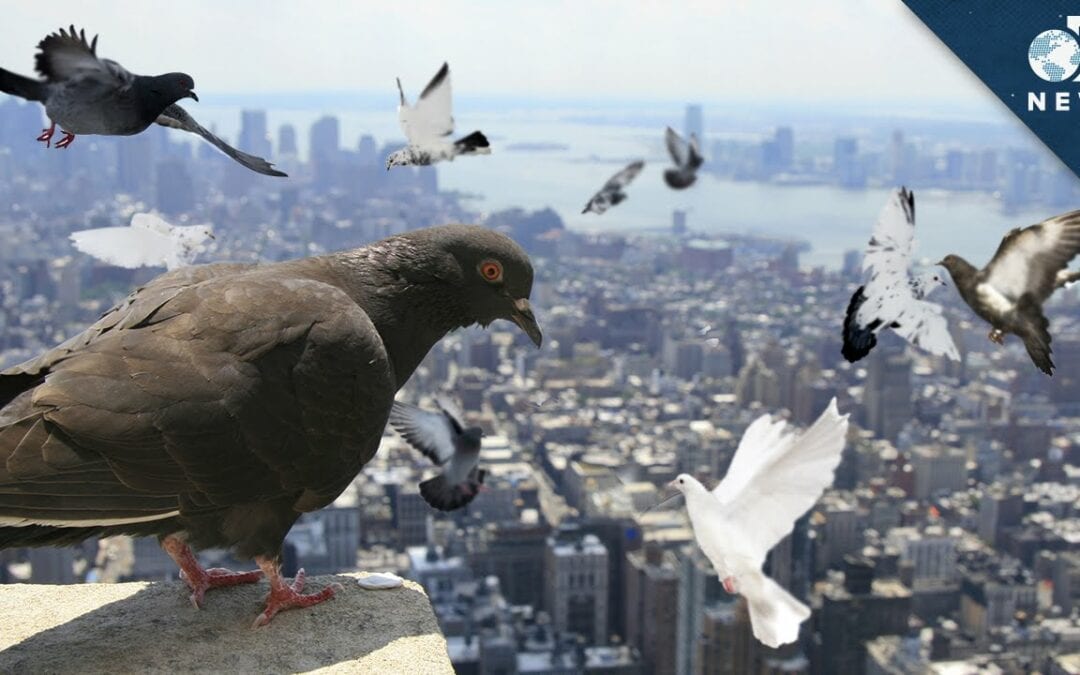
by Pigeon Patrol | Dec 24, 2021 | 4-S Gel Bird repellent, Animal Deterrent Products, Doves, history of pigeons, Pigeon Predators, Pigeon Spikes
In urbanized areas, pigeons are part of the daily life of city dwellers. We see them strolling on the sidewalks without fear of passers-by and cooing under bridges over passing cars. As such, the pigeon is not really a problematic bird species, but when perched, it can release an impressive amount of droppings on anything below. If you are facing this problem, whether inside or outside your home and want to deal with it, here’s how to clean up pigeon droppings.

Preliminary measures before cleaning pigeon droppings
Cleaning pigeon droppings involves removing the guano from the outside or inside of a building after the animal has been removed. Pigeon droppings are generally not harmful to health, except in extreme cases. On the other hand, they can strongly affect the appearance of a building, cause odours and attract insects. Except in certain unusual situations, you can remove the pigeon droppings yourself, unless the extent of the problem is beyond your control or you are experiencing breathing problems. At such times, it may be appropriate to hire the services of a residential exterminator.
Whether the pigeon droppings to be cleaned are on the front of your building or in your attic, the same process can be used. But before you rush to buy products or start cleaning the area, a health and safety risk assessment is essential, especially if the work will be done at height.
It is also recommended to take certain preliminary measures. A face mask, disposable coveralls and rubber gloves must be worn at all times, as well as safety glasses and a good pair of boots.
Products used to kill bacteria in pigeon droppings
There are many cleaning products developed especially for bird droppings. First, there are disinfectants, designed to kill bacteria and organisms, and simple cleaning agents, which, as their name suggests, are simply designed to clean. In most cases, a bucket of hot soapy water containing a little household detergent is a simple but ideal cleaning solution.
Cleaning pigeon droppings is no different from any other thorough cleaning work. With the right equipment, the work will be done quickly. To remove the guano on window sills and the like, a scraper is all you need to remove it. Moisten overly dry guano to soften it before removing it and reduce the amount of dust thrown into the air. Once all pigeon droppings have been scraped and removed from the surface, simply wash the area with a brush and the cleaning solution mentioned above.
What should be done with the excrement next? Small quantities of pigeon guano can be safely disposed of in a domestic or commercial waste bin.
When pigeon droppings become too overwhelming
Urban life means living with a host of animal species, including pigeons. Although this bird is not a threat to human health, the droppings it produces are never desirable, either outside or inside a building. Fortunately, with the right equipment, it is quite easy to remove pigeon droppings.
Source
Pigeon Patrol Products & Services is the leading manufacturer and distributor of bird deterrent (control) products in Canada. Pigeon Patrol products have solved pest bird problems in industrial, commercial, and residential settings since 2000, by using safe and humane bird deterrents with only bird and animal friendly solutions. At Pigeon Patrol, we manufacture and offer a variety of bird deterrents, ranging from Ultra-flex Bird Spikes with UV protection, Bird Netting, 4-S Bird Gel and the best Ultrasonic and audible sound devices on the market today.
Voted Best Canadian wholesaler for Bird Deterrent products ten years in a row.
Contact us at 1- 877– 4– NO-BIRD, (604) 585-9279 or visit our website at www.pigeonpatrol.ca
Pigeon/Pigeon Patrol / Pigeons Roosting / Vancouver Pigeon Control /Bird Spikes / Bird Control / Bird Deterrent / Pigeon Deterrent? Surrey Pigeon Control / Pest /Seagull deterrent / Vancouver Pigeon Blog / Birds Inside Home / Pigeons in the cities / Ice Pigeons/ What to do about pigeons/ sparrows , Damage by Sparrows, How To Keep Raccoons Away, Why Are Raccoons Considered Pests/ De-fence / Pigeon Nesting/ Bird Droppings / Pigeon Dropping/ woodpecker control/ Professional Bird Control Company/ Keep The Birds Away/ Birds/rats/ seagull/pigeon/woodpecker/ dove/sparrow/pidgeon control/pidgeon problem/ pidgeon control/flying rats/ pigeon Problems/ bird netting/bird gel/bird spray/bird nails/ bird guard
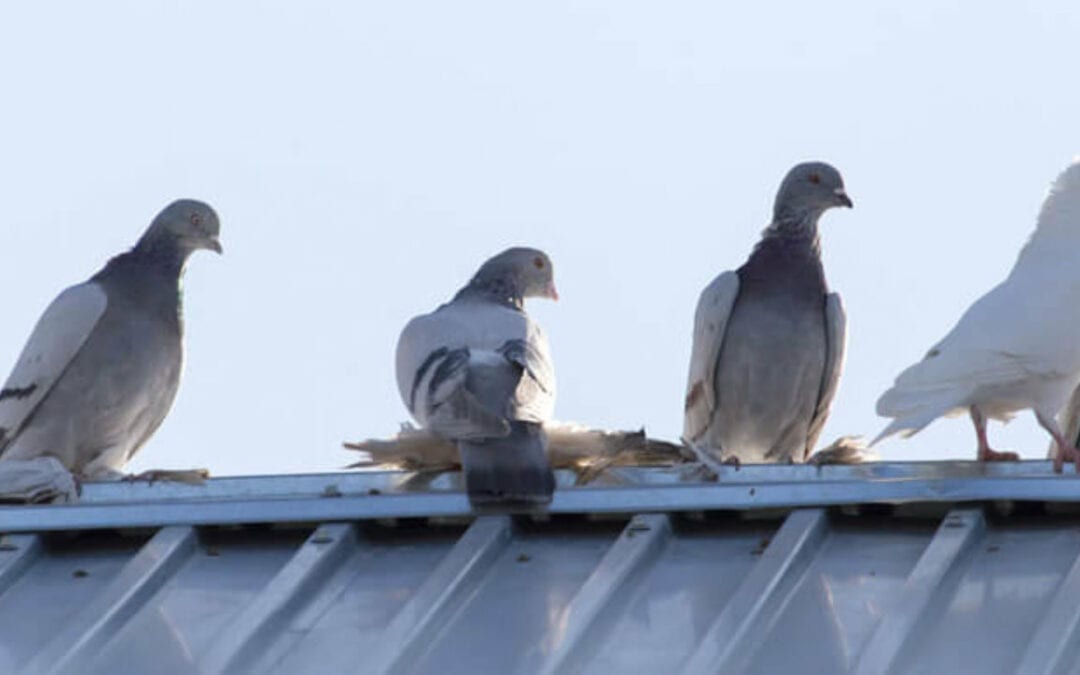
by Pigeon Patrol | Dec 16, 2021 | Bird Spike, Pigeon Predators, Pigeon Spikes, Pigeons, Pigeons in the News, Raccoons
How does a lone pigeon get back home? Does it choose the fastest, the easiest or the safest route?
As flying takes a lot of energy, birds generally adapt their flight speed and trajectory to reduce how much they use.
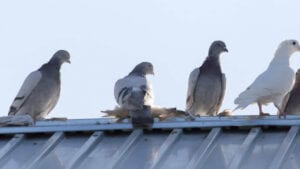
Now researchers at Swansea University have been using high-tech tags to study homing pigeons and to discover if these crucial decisions could be linked to helping them avoid attack by predators.
When the team monitored pigeons as they flew back to their loft at the Max Planck Institute of Animal Behaviour in Germany, they observed that the birds did sometimes adopt energy-efficient flight styles such as starting their climbs ahead of hills to reduce their climb angle. But they also saw pigeons using up energy by flying at high speeds.
Baptiste Garde, of the University’s Swansea Lab for Animal Movement (SLAM) led the new research which has just been published by the journal Royal Society Open Science
He said: “This might suggest that pigeons are just trying to get home as fast a possible, but by comparing the variation in their flight speed and altitude to those of an ultralight aircraft following the same path, we found that pigeon altitude and speed was, in fact, very variable.
“Flying this way is neither efficient in terms of time nor energy, but it might have an unexpected advantage. Indeed, if we look at the trajectory of a rabbit on the run, or a snipe flying away, we can see that they make unpredictable sharp turns to confuse their predators.
“That is what we call a protean behaviour. Pigeons might be using the same strategy to increase their chances of avoiding an attack.
“Protean flight has only been described in a handful of birds up until now but we think that it might be a relatively common behaviour, with birds flying in a more unpredictable way when they fly solo.”
Source
Pigeon Patrol Products & Services is the leading manufacturer and distributor of bird deterrent (control) products in Canada. Pigeon Patrol products have solved pest bird problems in industrial, commercial, and residential settings since 2000, by using safe and humane bird deterrents with only bird and animal friendly solutions. At Pigeon Patrol, we manufacture and offer a variety of bird deterrents, ranging from Ultra-flex Bird Spikes with UV protection, Bird Netting, 4-S Bird Gel and the best Ultrasonic and audible sound devices on the market today.
Voted Best Canadian wholesaler for Bird Deterrent products ten years in a row.
Contact us at 1- 877– 4– NO-BIRD, (604) 585-9279 or visit our website at www.pigeonpatrol.ca
Pigeon/Pigeon Patrol / Pigeons Roosting / Vancouver Pigeon Control /Bird Spikes / Bird Control / Bird Deterrent / Pigeon Deterrent? Surrey Pigeon Control / Pest /Seagull deterrent / Vancouver Pigeon Blog / Birds Inside Home / Pigeons in the cities / Ice Pigeons/ What to do about pigeons/ sparrows , Damage by Sparrows, How To Keep Raccoons Away, Why Are Raccoons Considered Pests/ De-fence / Pigeon Nesting/ Bird Droppings / Pigeon Dropping/ woodpecker control/ Professional Bird Control Company/ Keep The Birds Away/ Birds/rats/ seagull/pigeon/woodpecker/ dove/sparrow/pidgeon control/pidgeon problem/ pidgeon control/flying rats/ pigeon Problems/ bird netting/bird gel/bird spray/bird nails/ bird guard

by Pigeon Patrol | Dec 16, 2021 | 4-S Gel Bird repellent, Animal Deterrent Products, Bird Deterrent Products, Bird Law, Bird Netting, Pigeon Droppings, Pigeon Patrol's Services, Pigeon Predators, Pigeon Spikes
All birds should be hatched wild and live and fly free but unfortunately many don’t. Whether they are our pets because they are domestic or because they are rescued from the wild, they can’t free fly safely. We would break your heart with all the stories of pet birds lost. And how they suffer.
The biggest risk to a pet pigeon or dove is getting outside and being killed by a predator before he can get back in to safety. Wild pigeons derive all their security from being part of a flock that stays alert watching out for predators and knows what to do (and has the education and physiology to do) what is needed when under attack. A pigeon alone is extremely vulnerable. A domestic pigeon outside alone is in imminent danger. It is unsafe to take a pet pigeon outside unprotected. They need to be in an aviary or in the house.
Your pet pigeon or dove doesn’t want to get lost but many do, especially when allowed to hang around outside in the backyard or ride along unprotected on their person’s shoulder. And clipped wings do not protect birds outside. Birds are by their very nature aerodynamic and being outside unprotected with clipped wings is no safer. One little startle and, with the air currents outdoors, they are airborne. And in danger. Wild pigeons and doves derive all of their security from their survival of the fittest DNA, their education growing up in the wild and from being a part of a flock. Your pet pigeon, even if hatched wild, is at terrible risk if permitted to free fly. You (and your dogs and your patio cover, etc. etc.) offer no protection to pet birds, only an illusion of safety. We too wish your pet could fly free but the odds of tragedy are very high. It is just too great a risk.

Reprinted from the Palomacy Help Group, written by Ashley Dietrich
We’re discussing free-flying pet pigeons, and why not to do it.
It sounds great, right? These fantastic fliers, out in the fresh air, doing what nature intended? It sounds wonderful, and I wish I could give my birds the whole sky to enjoy. While pigeons and doves DO need exercise and sunlight, these needs can be met with a predator-proof aviary, out-of-cage time indoors, secure leashes, etc. Here are the reasons Palomacy advocates against allowing domestic birds outdoors un-caged/un-tethered:
1. Predators
— Hawks – they’re everywhere. I’ve read a report about a hawk grabbing a parrot off of an owner’s shoulder. Raptors focus tightly on their intended prey, swoop in, and won’t always notice or care if a human is nearby. Two years ago, a small hawk tried to get my dove Cecily as she sat inside the screen of my open window, sunning after a bath – I was sitting less than 3 feet away. My windows are now covered in hardware cloth in addition to the basic window screens, so it is safe to open the glass. I live in the woods, but hawks are city birds too.
— Cats and Dogs. Even with the benefit of wild instincts, countless birds fall victim to outdoor cats and dogs. Cat attacks are the #1 human-related cause of bird mortality. I’ve seen this first-hand too many times as a wildlife rehabber, and I’ll spare you the gory details.
2. Birds can get lost
Birds are more difficult to retrieve than 4-legged pets. It’s easy for something to spook a bird – if they go too high or too far, it can be even harder to get them back. They can cover more distance, quickly – and a bit of wind exacerbates this problem. The tamest of birds could bolt if startled, and not all pigeons have a homing instinct. Adding to the complications, many people do not realize they are pets, so birds are less likely to get help from strangers. The pigeons and doves I have retrieved after they were found outdoors have all been suffering from dehydration or hunger to some degree. They cannot find food and water in the wild.
Source
Pigeon Patrol Products & Services is the leading manufacturer and distributor of bird deterrent (control) products in Canada. Pigeon Patrol products have solved pest bird problems in industrial, commercial, and residential settings since 2000, by using safe and humane bird deterrents with only bird and animal friendly solutions. At Pigeon Patrol, we manufacture and offer a variety of bird deterrents, ranging from Ultra-flex Bird Spikes with UV protection, Bird Netting, 4-S Bird Gel and the best Ultrasonic and audible sound devices on the market today.
Voted Best Canadian wholesaler for Bird Deterrent products ten years in a row.
Contact us at 1- 877– 4– NO-BIRD, (604) 585-9279 or visit our website at www.pigeonpatrol.ca
Pigeon/Pigeon Patrol / Pigeons Roosting / Vancouver Pigeon Control /Bird Spikes / Bird Control / Bird Deterrent / Pigeon Deterrent? Surrey Pigeon Control / Pest /Seagull deterrent / Vancouver Pigeon Blog / Birds Inside Home / Pigeons in the cities / Ice Pigeons/ What to do about pigeons/ sparrows , Damage by Sparrows, How To Keep Raccoons Away, Why Are Raccoons Considered Pests/ De-fence / Pigeon Nesting/ Bird Droppings / Pigeon Dropping/ woodpecker control/ Professional Bird Control Company/ Keep The Birds Away/ Birds/rats/ seagull/pigeon/woodpecker/ dove/sparrow/pidgeon control/pidgeon problem/ pidgeon control/flying rats/ pigeon Problems/ bird netting/bird gel/bird spray/bird nails/ bird guard




 people to slip and fall, which makes it especially important to rid the birds from highly trafficked areas.
people to slip and fall, which makes it especially important to rid the birds from highly trafficked areas.






